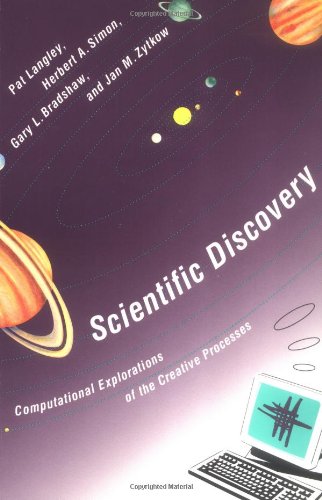
Inhaltsangabe
Scientific discovery is often regarded as romantic and creative -- and hence unanalyzable -- whereas the everyday process of verifying discoveries is sober and more suited to analysis. Yet this fascinating exploration of how scientific work proceeds argues that however sudden the moment of discovery may seem, the discovery process can be described and modeled.
Using the methods and concepts of contemporary information-processing psychology (or cognitive science) the authors develop a series of artificial-intelligence programs that can simulate the human thought processes used to discover scientific laws. The programs -- BACON, DALTON, GLAUBER, and STAHL -- are all largely data-driven, that is, when presented with series of chemical or physical measurements they search for uniformities and linking elements, generating and checking hypotheses and creating new concepts as they go along.
Scientific Discovery examines the nature of scientific research and reviews the arguments for and against a normative theory of discovery; describes the evolution of the BACON programs, which discover quantitative empirical laws and invent new concepts; presents programs that discover laws in qualitative and quantitative data; and ties the results together, suggesting how a combined and extended program might find research problems, invent new instruments, and invent appropriate problem representations. Numerous prominent historical examples of discoveries from physics and chemistry are used as tests for the programs and anchor the discussion concretely in the history of science.
Die Inhaltsangabe kann sich auf eine andere Ausgabe dieses Titels beziehen.
Über die Autorinnen und Autoren
Pat Langley is Associate Professor, Department of Information and Computer Science, University of California, Irvine.
Herbert Simon is Professor of Psychology at Carnegie-Mellon University. He was awarded the Nobel Prize in economics in 1978.
„Über diesen Titel“ kann sich auf eine andere Ausgabe dieses Titels beziehen.
Suchergebnisse für Scientific Discovery: Computational Explorations of...
Scientific Discovery: Computational Explorations of the Creative Processes
Anbieter: ThriftBooks-Dallas, Dallas, TX, USA
Paperback. Zustand: Good. No Jacket. Pages can have notes/highlighting. Spine may show signs of wear. ~ ThriftBooks: Read More, Spend Less. Artikel-Nr. G0262620529I3N00
Gebraucht kaufen
Versand innerhalb von USA
Anzahl: 1 verfügbar
Scientific Discovery: Computational Explorations of the Creative Processes
Anbieter: ThriftBooks-Atlanta, AUSTELL, GA, USA
Paperback. Zustand: Very Good. No Jacket. May have limited writing in cover pages. Pages are unmarked. ~ ThriftBooks: Read More, Spend Less 1.3. Artikel-Nr. G0262620529I4N00
Gebraucht kaufen
Versand innerhalb von USA
Anzahl: 1 verfügbar
Scientific Discovery: Computational Explorations of the Creative Processes
Anbieter: ThriftBooks-Atlanta, AUSTELL, GA, USA
Paperback. Zustand: Fair. No Jacket. Readable copy. Pages may have considerable notes/highlighting. ~ ThriftBooks: Read More, Spend Less 1.3. Artikel-Nr. G0262620529I5N00
Gebraucht kaufen
Versand innerhalb von USA
Anzahl: 1 verfügbar
Scientific Discovery : Computational Explorations of the Creative Processes
Anbieter: Better World Books, Mishawaka, IN, USA
Zustand: Good. Used book that is in clean, average condition without any missing pages. Artikel-Nr. GRP14132916
Gebraucht kaufen
Versand innerhalb von USA
Anzahl: 1 verfügbar
Scientific Discovery: Computational Explorations of the Creative Process
Anbieter: Anybook.com, Lincoln, Vereinigtes Königreich
Zustand: Fair. This is an ex-library book and may have the usual library/used-book markings inside.This book has soft covers. In fair condition, suitable as a study copy. Please note the Image in this listing is a stock photo and may not match the covers of the actual item,650grams, ISBN:0262620529. Artikel-Nr. 4326444
Gebraucht kaufen
Versand von Vereinigtes Königreich nach USA
Anzahl: 1 verfügbar
Scientific Discovery: Computational Explorations of the Creative Processes.
Anbieter: Kloof Booksellers & Scientia Verlag, Amsterdam, Niederlande
Zustand: as new. Cambridge, MA: The MIT Press, 1987. Paperback. 344 pp.- Scientific discovery is often regarded as romantic and creative -- and hence unanalyzable -- whereas the everyday process of verifying discoveries is sober and more suited to analysis. Yet this fascinating exploration of how scientific work proceeds argues that however sudden the moment of discovery may seem, the discovery process can be described and modeled. Using the methods and concepts of contemporary information-processing psychology (or cognitive science) the authors develop a series of artificial-intelligence programs that can simulate the human thought processes used to discover scientific laws. The programs -- BACON, DALTON, GLAUBER, and STAHL -- are all largely data-driven, that is, when presented with series of chemical or physical measurements they search for uniformities and linking elements, generating and checking hypotheses and creating new concepts as they go along. Scientific Discovery examines the nature of scientific research and reviews the arguments for and against a normative theory of discovery; describes the evolution of the BACON programs, which discover quantitative empirical laws and invent new concepts; presents programs that discover laws in qualitative and quantitative data; and ties the results together, suggesting how a combined and extended program might find research problems, invent new instruments, and invent appropriate problem representations. Numerous prominent historical examples of discoveries from physics and chemistry are used as tests for the programs and anchor the discussion concretely in the history of science. English text. Condition : as new. Condition : as new copy. ISBN 9780262620529. Keywords : PHILOSOPHY, Artikel-Nr. 251437
Gebraucht kaufen
Versand von Niederlande nach USA
Anzahl: 1 verfügbar
